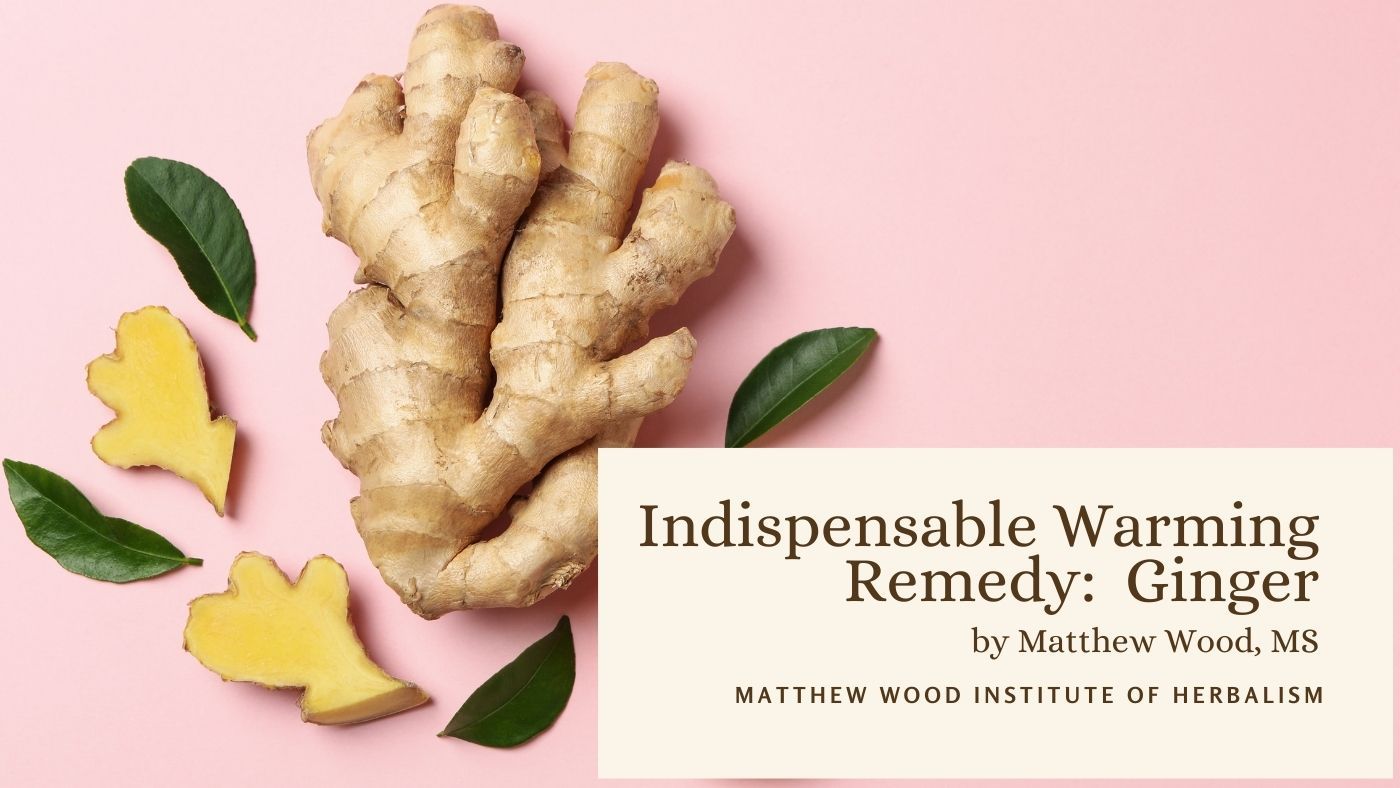X. The Indispensable Warming Remedy.
It is necessary to warm up as well as cool down, and none is as easily accessible, safe, and widely effective as the common ginger. It is also a good liniment for spasmed muscles.
Zingiberis officinalis. Ginger.
Ginger is native to southeastern Asia but is widely cultivated in tropical countries throughout the world. The rhizome is used in cooking and folk medicine. The pungent, sweet taste is due to the presence of two oleoresins, gingerol and shogaol, and volatile oils. Many of the traditional folk medical uses have been verified by modern pharmacology.
The warm, stimulating properties of the fresh rhizome suit it to cases where the organism or a part is cold, depressed, cramped up, or inactive. It is suited to people who feel chilly. Hot tea or soup with fresh ginger rhizome quickly opens the skin to release perspiration, chill, cold, and flu. It warms up the stomach to improve digestion, increases bile secretion, improves fat digestion, and movement of food through the tract, reducing stagnation, irritation, and gas. It reduces nausea of motion sickness, pregnancy, and other causes.
A poultice of fresh ginger rhizome on the chest increases blood circulation, activates respiration, and begins to move the mucus out of the lungs. Thus it is used in pneumonia, like onion and mustard packs. In addition, of course, it stimulates diaphoresis.
Ginger has been shown to reduce platelet aggregation and thus thin the blood. This increases circulation and is cooling to the system. The rhizome, which looks like a hand with fingers, is used to reduce heat and stiffness in arthritis. As a stimulant and blood thinner it increases circulation to the part and moves fluids through the cartilage and joint, which lies beyond the reach of the capillary bed. The gingerols have been shown to reduce levels of leukotrines and prostaglandins that stimulate inflammation. Ginger oil is excellent as an external liniment on stiff, cold, spasmed muscles.
The fresh rhizome used in cooking, tea, or even given in tincture (30 drops, once a day), contains enough oil to be nourishing. It regulates blood sugar levels and increases immune tone.
Herbalist Margi Flint comments, “ginger is specific for labor and delivery. It connects the mother to the child in the womb. The rhizome looks like that little expected baby and expresses the warmth of mother love. Have everyone in the room drinking the tea. It unites them all in the spirit of the delivery. In long labors it keeps up the strength. Add a little honey or maple syrup to make blood sugar available.
“Ginger is better suited to the kapha constitution (large, damp, cold) than the pitta (hot) or vata (dry), because it is so warming and stimulating If needed for people who are not cold (pitta, vata) use in small amounts.”
Ginger oil is a superlative antispasmodic for cramped muscles, especially in chronic cases which are aggravated, because it is warming and activating. It would be contraindicated in inflamed muscles. I have often used this for spasm in the back or neck. If the oil is unavailable, some other preparation may be used.
Taste: pungent, sweet, warm, moist, diffusive, stimulating
Tissue State: depression, constriction, atrophy
Specific Indications
Head
Respiratory Tract
Digestive Tract
Heart and Circulation
Female Sexual System
Muscular and Skeletal System
Fever
Other
Preparation and dosage:
Ginger rhizomes can usually be purchased fresh at a food store and are considered entirely safe. The dried rhizomes are so hot they can burn sensitive tissues and are seldom used. For tea grate 1/2 to 1 teaspoon of the fresh rhizome and steep 10 minutes. The candied rhizomes are used to warm the stomach. Average dose of the tincture of the fresh rhizome: 15-20 drops, children half that amount.
Cautions:
Not dangerous, but too warming for some people. Dried ginger used in a bath can cause severe irritation of sensitive tissue (vagina).
Formulary:
“Ginger sends the energy of other herbs to the uterus” (Margi Flint).
Looking to learn more about topics in this blog? Check out these great A-Z Herbal Classes.
"In a busy practice covering over twenty-five years and tens of thousands of clients, a person learns what remedies are of invaluable service. I would like to share my selection – herbs I choose and herbs that choose me."
Zingiberis officinalis. Ginger.
Ginger is native to southeastern Asia but is widely cultivated in tropical countries throughout the world. The rhizome is used in cooking and folk medicine. The pungent, sweet taste is due to the presence of two oleoresins, gingerol and shogaol, and volatile oils. Many of the traditional folk medical uses have been verified by modern pharmacology.
The warm, stimulating properties of the fresh rhizome suit it to cases where the organism or a part is cold, depressed, cramped up, or inactive. It is suited to people who feel chilly. Hot tea or soup with fresh ginger rhizome quickly opens the skin to release perspiration, chill, cold, and flu. It warms up the stomach to improve digestion, increases bile secretion, improves fat digestion, and movement of food through the tract, reducing stagnation, irritation, and gas. It reduces nausea of motion sickness, pregnancy, and other causes.
A poultice of fresh ginger rhizome on the chest increases blood circulation, activates respiration, and begins to move the mucus out of the lungs. Thus it is used in pneumonia, like onion and mustard packs. In addition, of course, it stimulates diaphoresis.
Ginger has been shown to reduce platelet aggregation and thus thin the blood. This increases circulation and is cooling to the system. The rhizome, which looks like a hand with fingers, is used to reduce heat and stiffness in arthritis. As a stimulant and blood thinner it increases circulation to the part and moves fluids through the cartilage and joint, which lies beyond the reach of the capillary bed. The gingerols have been shown to reduce levels of leukotrines and prostaglandins that stimulate inflammation. Ginger oil is excellent as an external liniment on stiff, cold, spasmed muscles.
The fresh rhizome used in cooking, tea, or even given in tincture (30 drops, once a day), contains enough oil to be nourishing. It regulates blood sugar levels and increases immune tone.
Herbalist Margi Flint comments, “ginger is specific for labor and delivery. It connects the mother to the child in the womb. The rhizome looks like that little expected baby and expresses the warmth of mother love. Have everyone in the room drinking the tea. It unites them all in the spirit of the delivery. In long labors it keeps up the strength. Add a little honey or maple syrup to make blood sugar available.
“Ginger is better suited to the kapha constitution (large, damp, cold) than the pitta (hot) or vata (dry), because it is so warming and stimulating If needed for people who are not cold (pitta, vata) use in small amounts.”
Ginger oil is a superlative antispasmodic for cramped muscles, especially in chronic cases which are aggravated, because it is warming and activating. It would be contraindicated in inflamed muscles. I have often used this for spasm in the back or neck. If the oil is unavailable, some other preparation may be used.
Taste: pungent, sweet, warm, moist, diffusive, stimulating
Tissue State: depression, constriction, atrophy
Specific Indications
Head
- Headache, migraine, vertigo; especially associated with motion sickness.
Respiratory Tract
- Incipient colds, post nasal drip, influenza (hot decoction of the fresh rhizome as a diaphoretic).
- Swollen glands in throat, sore throat.
- Stuck mucus in the chest, pneumonia, bronchitis (warm poultices).
- Dry, ticklish cough (tea).
Digestive Tract
- Increases or decreases appetite.
- Lack of appetite, saliva, stomach acid (candied rhizome).
- Inactive gastrointestinal mucosa; with indigestion, fullness, catarrh, flatulence, colic, spasm, diarrhea, dysentery; sometimes associated with dietary indiscretion, tainted food or chills (warm tea of the fresh rhizome; candied rhizomes; capsules).
- Flatulence caused by ingesta in a state of decomposition.
- Gastritis of alcoholics.
- Sluggish liver.
- Peptic ulcers.
- Digestive aid (a cup of fresh rhizome tea in late afternoon before dinner).
- Nausea of food poisoning.
- Nausea of travel
- and seasickness.
- Nausea of pregnancy; “whoa, my world is moving, where’s the horizon” (Margi Flint).
- Diarrhea of relaxed bowel, or colic, spasm.
- Intestinal fermentation and putrefaction; dysentery, cholera.
Heart and Circulation
- Poor peripheral circulation; coldness, stagnant blood; sticky platelets (warm tea, bath, fresh rhizome; bath of dried rhizome can cause irritation of sensitive tissue).
- Blood thinner; to wean off coumadin; 2 capsules daily of ginger plus 1 tablespoon of flaxseed oil; work with their doctor (William Mitchell).
Female Sexual System
- Warms up a cold uterus; relieves period cramps due to cold and stagnant blood (warm poultice of the fresh rhizome).
- Cramps that precede the period.
- Specific for parturition, labor, and delivery: maintains strength and uterine contractions (warm tea of the fresh rhizome; in prolonged labor add honey or maple syrup to provide immediate blood sugar).
Muscular and Skeletal System
- Cold extremities (foot bath or tea, fresh rhizome).
- Sore, cramped muscles (ginger oil or salve externally).
Fever
- Fever and chills, achy, can’t get warm enough.
- Mosquito bites (bath).
Other
- Drop in energy around 3 o’clock in the afternoon (warm tea).
- Immune deficiencies; people feel exhausted, low energy; it is gentle and nourishing (food or tea of fresh rhizome).
- Inflammation and pus in the eyes (infuse pulverized ginger root in wine overnight, apply externally).
- “Mistiness of the eyes” (take the above wine, 3 parts, add 1 part rue and 1 part hyssop, apply externally).
- Pimples (the above wine externally).
Preparation and dosage:
Ginger rhizomes can usually be purchased fresh at a food store and are considered entirely safe. The dried rhizomes are so hot they can burn sensitive tissues and are seldom used. For tea grate 1/2 to 1 teaspoon of the fresh rhizome and steep 10 minutes. The candied rhizomes are used to warm the stomach. Average dose of the tincture of the fresh rhizome: 15-20 drops, children half that amount.
Cautions:
Not dangerous, but too warming for some people. Dried ginger used in a bath can cause severe irritation of sensitive tissue (vagina).
Formulary:
“Ginger sends the energy of other herbs to the uterus” (Margi Flint).
Looking to learn more about topics in this blog? Check out these great A-Z Herbal Classes.
"In a busy practice covering over twenty-five years and tens of thousands of clients, a person learns what remedies are of invaluable service. I would like to share my selection – herbs I choose and herbs that choose me."
References
Traditional (1-27, 30-32), William Mitchell (1, 20), Margi Flint (16, 23, 28, 29), John Bastyr (22), Eva and Eugene Graf (2, 3, 6, 11, 27), Christopher Menzies-Trull (1, 7, 10, 12-14), Matthew Wood (25), John William Fyfe (8, 9), Hildegard von Bingen (8, 30, 31), Aviva Rom (4).
Selections from The Earthwise Herbal By Matthew Wood MS published by North Atlantic Books, in two volumes, 2008-9
Traditional (1-27, 30-32), William Mitchell (1, 20), Margi Flint (16, 23, 28, 29), John Bastyr (22), Eva and Eugene Graf (2, 3, 6, 11, 27), Christopher Menzies-Trull (1, 7, 10, 12-14), Matthew Wood (25), John William Fyfe (8, 9), Hildegard von Bingen (8, 30, 31), Aviva Rom (4).
Selections from The Earthwise Herbal By Matthew Wood MS published by North Atlantic Books, in two volumes, 2008-9
**Disclaimer**
The information provided in this digital content is not medical advice, nor should it be taken or applied as a replacement for medical advice. Matthew Wood, the Matthew Wood Institute of Herbalism, ETS Productions, and their employees, guests, and affiliates assume no liability for the application of the information discussed.
The information provided in this digital content is not medical advice, nor should it be taken or applied as a replacement for medical advice. Matthew Wood, the Matthew Wood Institute of Herbalism, ETS Productions, and their employees, guests, and affiliates assume no liability for the application of the information discussed.


